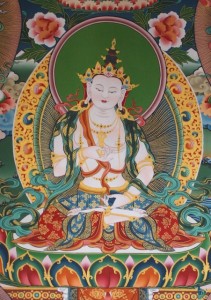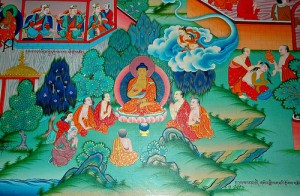
The following is respectfully quoted from “Perfect Conduct” with commentary by Dudjom Rinpoche:
The fourteen root downfalls are explained as follows:
The fourteen root downfalls are likened to the trunk of a fruit-bearing tree. In dependence upon the trunk, all the branches and leaves develop. If the trunk deteriorates, the entire tree will tumble down. Likewise, the root vows are like the trunk, and if they are guarded it is through them that all noble qualities of the path develop. Otherwise, if the trunk is damaged, this becomes the root cause for falling to the lowest hell realm, where there is no chance for liberation and where unbearable suffering is endured. To avoid this, it is necessary to carefully guard against these fourteen.
4.b.3(b) An extensive explanation of the fourteen:
4.b.3(b.1) Disrespecting the vajra master:
The first concerns heartfelt disrespect for the vajra master who has been kind in the three ways. To belittle him or disturb his mind is the first downfall because of its weight.
The vajra master is one who has bestowed empowerment, transmissions, and pointing-out instructions. These are the three expressions of kindness because they make transmission complete according to inner tantric practice. In addition, the vajra master is one who has given a direct introduction to the nature of the mind. Being disrespectful to such a master, either directly through body and speech or indirectly through one’s mind, or opposing the advice given by him or harming or disturbing those who are in the lama’s immediate retinue, qualifies as the first and heaviest downfall. This is the first of the fourteen root downfalls because of the strength of the weight of negative karma it carries.
The vajra master should be cherished as the essential nature of all buddhas and should, therefore, be the principle object of one’s devotion, admiration, and respect. Moreover, in dependence upon one’s relationship with the vajra master, all noble qualities of the path, as well as the resultant qualities, are developed. If one allows the precious relationship between oneself, as the disciple, and the irreplaceable vajra master deteriorate in the ways described above, then whatever meditation one aspires to accomplish will only be the cause for birth as a rudra. One must therefore be extremely careful.
The second root downfall will be posted tomorrow…



